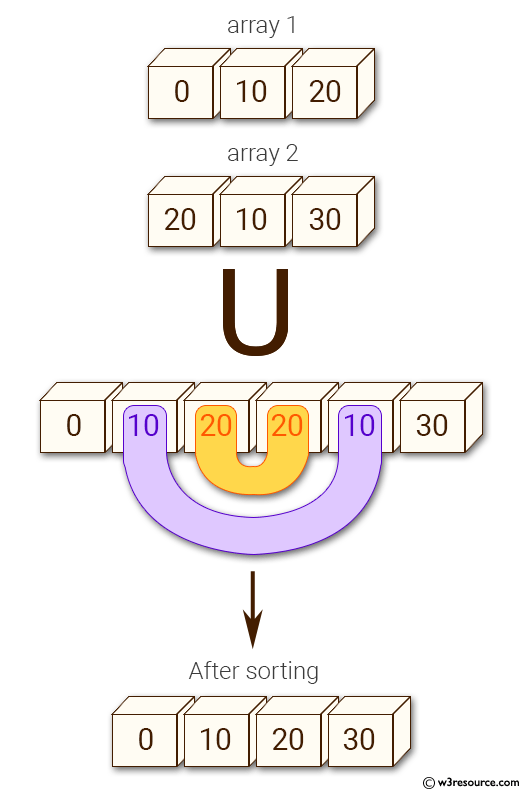NumPy: Find the union of two arrays
Union of Two Arrays
Write a NumPy program to find the union of two arrays. Union will return a unique, sorted array of values in each of the two input arrays.
Pictorial Presentation:

Sample Solution:
Python Code:
# Importing the NumPy library with an alias 'np'
import numpy as np
# Creating a NumPy array 'array1'
array1 = np.array([0, 10, 20, 40, 60, 80])
# Printing the contents of 'array1'
print("Array1: ", array1)
# Creating a Python list 'array2'
array2 = [10, 30, 40, 50, 70]
# Printing the contents of 'array2'
print("Array2: ", array2)
# Finding and printing the unique values that are in only one (not both) of the input arrays
print("Unique values that are in only one (not both) of the input arrays:")
print(np.union1d(array1, array2))
Sample Output:
Array1: [ 0 10 20 40 60 80] Array2: [10, 30, 40, 50, 70] Unique sorted array of values that are in either of the two input array s: [ 0 10 20 30 40 50 60 70 80]
Explanation:
In the above code –
array1 = np.array([0, 10, 20, 40, 60, 80]): Creates a NumPy array with elements 0, 10, 20, 40, 60, and 80.
array2 = [10, 30, 40, 50, 70]: Creates a Python list with elements 10, 30, 40, 50, and 70.
print(np.union1d(array1, array2)): The np.union1d function returns the sorted union of the two input arrays, which consists of all unique elements from both ‘array1’ and ‘array2’. In this case, the union is [0, 10, 20, 30, 40, 50, 60, 70, 80], so the output will be [ 0 10 20 30 40 50 60 70 80].
For more Practice: Solve these Related Problems:
- Compute the union of two arrays using np.union1d and check that the result is unique and sorted.
- Create a function that merges two arrays and removes duplicates without using np.union1d.
- Compare the union operation on arrays with overlapping and non-overlapping values.
- Validate that the union of two arrays contains every distinct element from both inputs.
Go to:
PREV : Set Exclusive-Or of Arrays
NEXT : Test All Elements are True
Python-Numpy Code Editor:
Have another way to solve this solution? Contribute your code (and comments) through Disqus.What is the difficulty level of this exercise?
Test your Programming skills with w3resource's quiz.
